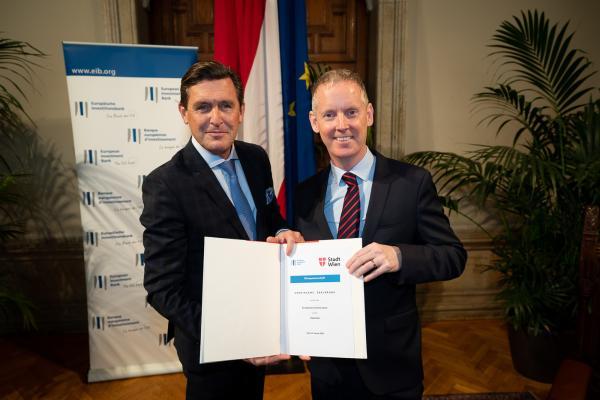
- First EU climate bank agreement with a large EU city
- EIB Vice-President McDowell: signal for other cities in Europe
- City Councillor Peter Hanke: Vienna as a “climate model city” pioneer in Europe
The European Investment Bank (EIB) and the City of Vienna are seeking to deepen their partnership to combat climate change. They signed a “Joint Declaration on Climate Partnership” in Vienna, under which future City of Vienna projects concerning housing, energy, waste and transport will be subject to advance analysis for possible EU climate bank financing, taking their climate action contribution into account. This is the EU climate bank’s first partnership with a large EU city. Last autumn, the EIB decided to align all financing activities with the goals of the Paris climate agreement. The EU bank plays a crucial role in the “Green Deal” presented by the new European Commission President Ursula von der Leyen.
The EIB and the City of Vienna have already implemented several climate action projects, totalling over EUR 1bn, most of which were related to energy efficiency measures in municipal housing. The City has been pursuing an active climate action policy for over two decades with its “KLiP” climate action programme.
EIB Vice-President responsible for energy policy Andrew McDowell made the following comment on the signing: “The EIB – the EU climate bank – intends to redouble its efforts to combat climate change. Over the next ten years, we plan to kick-start climate action projects worth EUR 1tn. We will also bring all of the Bank's financing activities into line with the Paris climate agreement by the end of 2020. Against this backdrop, I very much welcome this first climate partnership with the City of Vienna, indeed with any city in the EU, as it is only by working closely with ambitious partners that we can overcome the huge challenge of climate change. This partnership is also a signal for other cities in Europe.”
Vienna Councillor for Finance Peter Hanke sees the partnership with the EIB as a key element of the City's manifold efforts to expand climate action: “In Vienna, we have set ourselves ambitious climate action objectives. We have also fully focused the City's finances on climate action with the introduction of the Vienna climate budget and the Klima-Milliarde (“climate billion”) in the 2020 budget. This partnership with the European Investment Bank will enable us to implement further major climate action and adaptation projects in the future,” he said during the signing ceremony at Vienna City Hall.
Many important investment projects have already been implemented with EIB financing. These include the “Energy optimisation sludge treatment” project for Vienna's main wastewater treatment plant as well as comprehensive thermal renovation of municipal housing with Wiener Wohnen. In the future, the City of Vienna and the EIB will concentrate on the most climate-relevant areas such as housing, energy, waste management and transport.
Climate action in Vienna
The City of Vienna has been implementing ambitious climate action initiatives since 1999, already managing to cut per capita greenhouse gas emissions in the city by a total of 34% between 1990 and 2018. The new “Smart City Vienna” framework strategy has set the city further ambitious climate goals for the future. Local per capita greenhouse gas emissions are expected to fall by 50% by 2030 and 85% by 2050.
In 2018, Vienna joined the Covenant of Mayors for Climate and Energy, an EU initiative set up by the European Commission. It aims to go further than the EU's energy policy targets related to reducing carbon dioxide emissions by 40% by 2030. Nearly 8 000 authorities have joined so far, including the metropolitan areas of Paris, London and Berlin. These cities share the vision of cutting carbon emissions (decarbonisation) and ensuring residents have access to safe, sustainable and affordable energy.

